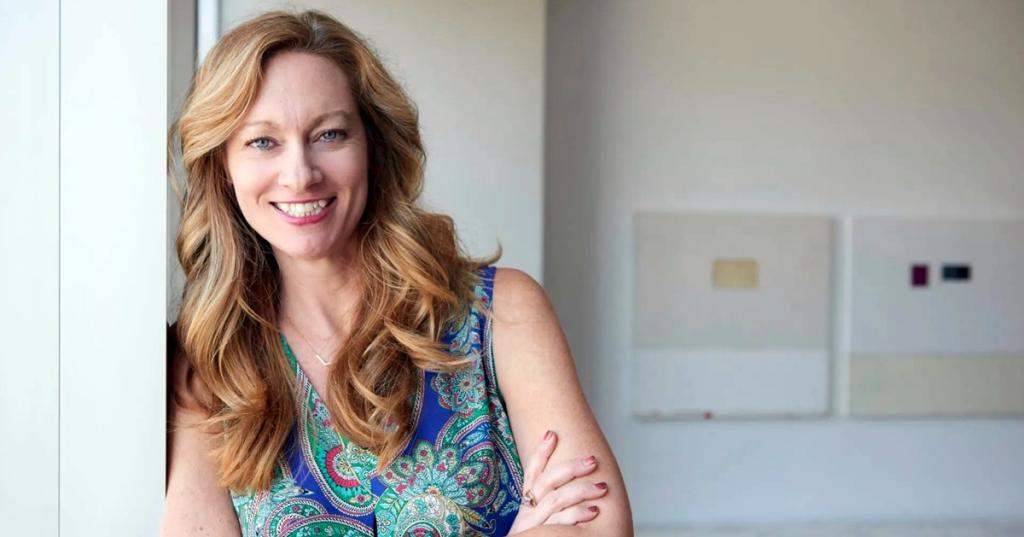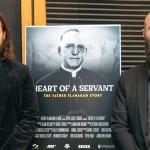Growing up as the daughter of a medical examiner for three counties in northern Michigan, author and screenwriter Jennifer Graeser Dornbush is well-acquainted with death.
She says,
“The office was in our home. So I grew up around death from the time I was a baby, pretty much. And learned all there was to know about death investigation and forensics, because it was on our kitchen table and in our house all the time, 24/7.”
But as a Catholic, she also likes to shine light into the darkness of crime.
Meet Jennifer Dornbush
I’m happy to call Dornbush a friend, and we share a love of writing, afternoon tea and dachshunds.
I met her back in 2017, when I also did my first video interview with her (you only see her, but I’m the one asking the questions).
She talks about what it means to be a Catholic working in mainstream culture.
The Writer’s Journey
After working as a journalist and a teacher, Dornbush eventually turned to screenwriting. She also earned a degree at the Forensic Science Academy in Los Angeles, and authored Forensic Speak: How To Write Realistic Crime Dramas.
From there, Dornbush has developed film and TV projects with Lifetime TV, Enspire, Echo Lake, Wolper Productions, Red Kimono, David Janolari Entertainment and Hoplite, among others.
She also wrote the book and novel for the 2018 faith-based movie God Bless the Broken Road.
As an author, she has several fiction and nonfiction books to her credit, including a crime-fiction series called The Coroner’s Daughter. The fourth book in that series, Frozen Lives, comes out on Oct. 29.
It’s already getting great reviews. Here’s one:
“Jennifer Dornbush scares the living hell out of me. When I want to stay up all night, I just read one of her books, and Frozen Lives doesn’t disappoint. On par with Dennis Lehane’s Mystic River, Frozen Lives weaves a terrifying tale of evil and paranoia, and when you go to bed at night, make sure your doors are locked tight. A terrific story.”
Don Bruns, bestselling author and editor of Back in Black
Connecting Again With Dornbush
Recently, I caught up with Dornbush over Zoom.
We discussed a variety of subjects, including the craft of writing, why women are fascinated with crime stories, transitioning from page to screen and back again, how vital community is for writers, the value of exploring the dark side of humanity .. and the importance of her Catholic faith.
The whole interview is below, but here are some excerpts:
On beginning screenwriting:
My background, all that helped me later become a crime writer. I should say it, my writing.
Because when I sat down in 2002 and actually started taking screenwriting seriously, and went through Act One and really started learning the craft, you start asking yourself, “Well, what kind of stories do I want to tell? Who am I as a storyteller? ”
And as I was brainstorming story ideas, a lot of them fell within that genre of crime or investigation. And I really hadn’t pieced it together in my head that like, “Oh yeah, that came from the way I grew up.”
On the appeal of stories about solving crimes:
The other thing when I teach about this genre is the puzzle aspect of it. We like to solve the mystery. We like to solve the puzzle.
And even in writing, in reading or writing this genre, it’s a very left brain, right brain. It satisfies both, because it has to be very logical, and the puzzle has to click perfectly, a perfect puzzle.
But also there’s that emotional roller coaster of the hero’s journey that you need to go on to make it satisfying. So I think it kind of clicks both of those parts of the brain together. And we like that it’s very satisfying.
On the difference between novels and screenplays:
People say that my fiction, my novel writing, reads more like something they would see. It reads very visual. I’m like, there’s a reason for that. I was trained to do that.
So I still find myself wanting to rush through. And then my second drafts, I have to kind of tease it out. And then when my editor gets involved, he’s like, “OK, we need a little bit more here and a little bit more here.”
On how her Catholicism affects her life and writing:
My personal mission that guides me, but also what I write about, is that my goal is to shed hope, some hope and light into the dark recesses of the human experience. So when you think about the dark recesses of the human experience.
So there’s really nothing, because we are of this world, and so I don’t feel like there’s anything I cannot talk about.
In context of there’s always hope and a light, even unless somebody really chooses evil … never repents, never. But for the most part, even the people surrounding them may have moments of hope or light. So that’s where I work.
… I grew up in a Christian home, a home where God and life was first. And so everything was looked at through that light, through that lens of God, redemption, salvation. What is God’s plan and purpose in this? What does He want out of this?
Here’s the whole thing. It’s long, but it’s worth it:
The Next Step for The Coroner’s Daughter
Dornbush also recently signed a deal with Texas-based Believe Entertainment (founded by Catholic filmmakers Chuck Konzelman and Cary Solomon, who did the films Unplanned and Nefarious) to develop The Coroner’s Daughter into a TV series.
Learn more about Dornbush’s life and work at JenniferDornbush.com.
Image: Courtesy Jennifer Dornbush
Don’t miss a thing: Subscribe to all that I write at Authory.com/KateOHare.














